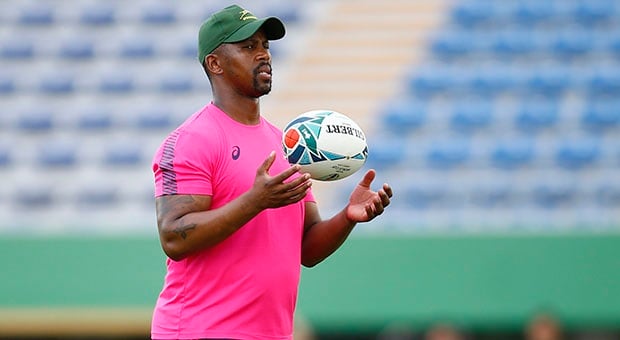
- Skills coaches in South Africa were previously seen as optional extras in the technical team.
- The Stormers have reportedly roped in former Saracens and Sharks coach Brendan Venter as a kicking skills specialist.
- Springbok assistant coach Mzwandile Stick shone the light on the value of a skills coach with his contribution to the Rugby World Cup win.
For a long time in South African rugby, skills coaches were treated as nerdish additions to rugby technical teams, but the trend has changed to acceptance and necessity.
The value of a skills coach, in the way New Zealanders value people like Wayne Smith, has shot up and the effect was palpable in how some South African teams performed.
Teams have welcomed the role of a skills coach to any management set-up, going so far as to seek some of the most experienced rugby minds in the game to fill the role.
Sunday newspaper Rapport reported the Stormers had enlisted former Saracens and Sharks coach Brendan Venter as their kicking skills coach to help scrumhalf Herschel Jantjies and Damian Willemse with their tactical kicking.
But deeper than that, South Africa has had career skills coaches whose tasks have been to tweak some of the most microscopic facets of a player's game, ranging from their gait to the hand they carry the ball and often how to limber oneself in the tackle to best effect an offload or recycle possession.
Sharks backline coach Dave Williams, who made his name as a top skills coach, says the value of the role has increased over time, especially where coaching teams are smaller.
The skills coach, he added, connects defence, attack and kicking together in such a way that oft-convoluted messages can be passed down to players in the simplest and most effective form.
The Sharks, whose skills coach is Phiwe Nomlomo, did well to get their players' ball skills on par with the kind of rugby they wanted to play. They wanted to pressure opponents into making turnovers on defence and move the ball quickly on offence, regardless of whether the forwards or the backline had the ball. The results were earth-shattering.
Newcomers such as prop Ox Nche and No 8 Sikhumbuzo Notshe were playing like they had been in Durban for a decade, getting involved in some of the most sumptuous attacking moves before Super Rugby ended abruptly.
"I think the skills role has massive scope to an organisation and the players enjoy it," Williams says.
"I'll use the Sharks as an example. We had a big coaching staff previously and sometimes the message of what you're trying to deliver can get lost because you've got a lot of coaches and everyone needs their time.
"This year, we brought it down to about three full-time coaches with the team, which is like a skeleton crew. And what you sometimes find with smaller coaching staff is that the messaging is much clearer.
"Having that hybrid skills role guy - who can float around from the defensive side, to the kicking game and to the attacking side - is of such high value to an organisation.
"That's where we in South African rugby can grow. We cover it well now but as you look to evolve as an organisation, you need a skills guy."
At the top, the skills coach has found success as well.
Mzwandile Stick helped the Springboks win the 2019 Rugby World Cup by rigorously training the likes of wingers Cheslin Kolbe and Makazole Mapimpi on different ways to exploit defensive openings.
The result was that both came through with tries when it mattered most - the final against England at Yokohama International Stadium.
In the domestic scene, coaches such as Hayden Groepes (Bulls) and Sino Ganto (former Cheetahs skills coach) used their experience as former backs to good effect as skills coaches.
"I did the skills role at Bath and London Irish and you get a real one-on-one connection by doing work with a player individually or in pairs," says Williams.
"What Stick does well is that he makes sure the players understand what pictures to look for and how to use various techniques to influence the game or the bigger part of the model of the game that the team has.
"Sometimes we put together big plans about the game and how to influence it but really developing them as individuals - both on and off the field - is of huge value.
"All organisations should have that skills role but it must cover all portfolios: attack, defence, kicking and mental."